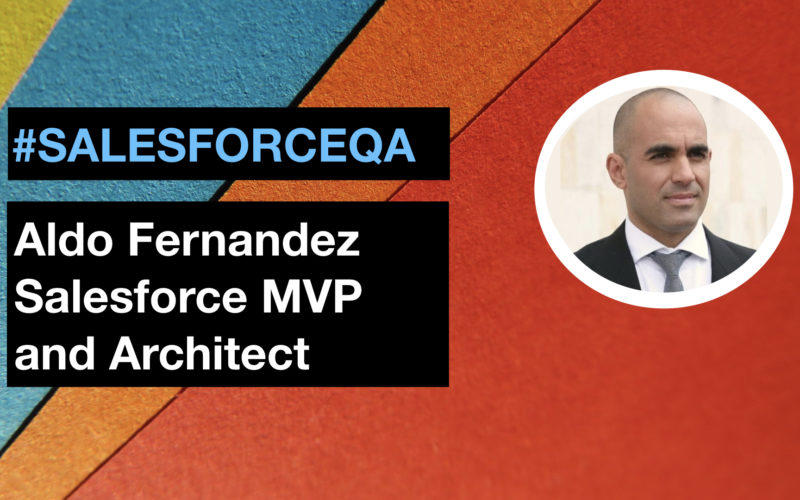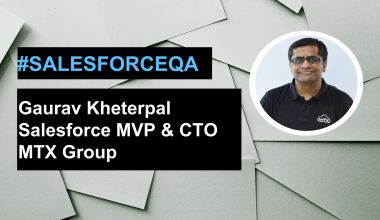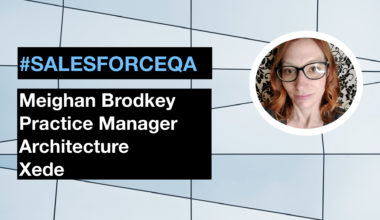In Third Republic’s Salesforce Q&A Series, we speak to industry leaders about what changes they have seen in the Salesforce universe, where they think it is heading, and what this means for those working in the ecosystem today. We recently caught up with Aldo Fernandez an experienced Salesforce MVP and Architect.
Aldo is a veteran Salesforce Application and System Architect, as well as a Salesforce Developer based in South America. He took the time to talk with us about how his career in Salesforce began and reveals his top tips, tricks and insights for those looking to develop their own careers within the world of Salesforce.
Salesforce Republic (SR): You’re a veteran Salesforce Developer, Salesforce MVP and Architect with over a decade of experience in the Salesforce ecosystem. Could you explain a bit about how you got to where you are today?
Aldo Fernandez (AF): It has been a long ride since I started in the Salesforce ecosystem. In 2008, I was working for Oracle on an integration project when I was introduced to Salesforce. At that moment, Salesforce was already a consolidated CRM solution and an emerging platform for product development.
After that project, I was super engaged with the multi-tenant architecture and all the technical possibilities that the platform brings to enterprise solutions. Since then I have worked on different projects and industries around the globe.
SR: How has the world of Salesforce changed throughout your time working in it?
AF: Technology is different from other industries in terms of evolution. Things evolve really fast in a short time period and Salesforce has a commitment to strive for innovation. I have witnessed the rise (and fall) of different technologies through acquisitions, development, and standardisations. Change was the only constant in Salesforce.
SR: What do you enjoy most about working as a Salesforce Developer/Architect, and what are the biggest challenges you have faced?
AF: I love the fact that things are always evolving and you need to be learning new trends and tricks. Applying all your knowledge in a creative way to cope with new requirements or pushing the platform to the limit, is always a great and enjoyable experience.
Every industry/vertical has its own challenges and complexities, but a common scenario that went into the spotlight is legal compliance. All the new and different regulations that have been introduced by the EU, Canada, and California; require a solid data strategy as never seen before.
SR: What are your top pointers for others starting out in their Salesforce career?
AF: Try to understand how the different components of a solution need to coexist in harmony. Learn the capabilities of each product offered by Salesforce and dig deeper into specific topics depending on your interests (administration, data analytics, development, consulting, marketing, etc.). Trust in Trailhead and Trailmixes.
SR: Do you think Salesforce certifications are a good way to continue career development?
AF: Yes they are, but remember, while certifications are extremely important in the ecosystem, nothing will replace hands-on experience. It’s like when you get your driver’s license; you don’t become an expert driver the minute after you receive your license. It comes with time and experience that you reach that expertise level.
SR: As a co-organiser of the Montevideo, UY Developers Group, could you explain a bit about the topics that the events cover?
AF: We have a very intense and vibrant Salesforce Developers community with a unique profile. There are more developers than admins, consultants or end-users. This is because we are an off-shore software factory country and many US and EU companies are looking for that kind of expertise.
We have monthly meetings where we discuss different topics at all levels, from beginners to experts stuff covering all development related activities.
SR: How important do you think it is for Salesforce community members to become part of groups and attend local events, such as those Montevideo hosts?
AF: I think that it’s super important to be an active member of the Salesforce community. The learning and sharing experiences that you find at local events is something you can’t get online or under a trailhead badge.
It doesn’t matter your expertise level. You will always learn something new or have a different perspective from a given topic. That’s how you grow personally and professionally.
SR: How important do you think the Salesforce community is to achieving success in the ecosystem?
AF: It’s critical. When you understand that you are not alone and your problems and challenges are the same as other community members; you will realise that we are all in the same boat. I have never witnessed a community so eager to share, contribute and help others as equals. Diversity is one of the key elements in the community’s success.
SR: What emerging trends are you most excited about, and why?
AF: I’m very excited about Lightning Web Components going open source. We are witnesses of a dramatical change in the way we develop apps. For the last ten years, we were a private framework oriented platform. Now we are standard oriented which opens possibilities for everyone. Those with javascript knowledge will be able to become very productive in a short time.
SR: Do you have any predictions for the future of Salesforce and where the ecosystem is headed?
AF: I can see a trend in the ecosystem to incorporate new products as acquisitions of other companies (Mulesoft, Tableau, Quip, ExactTarget, Radian6, CloudCraze). This means that specific deep-knowledge of these products is going to be in high demand.
SR: Finally, do you have any further comments or advice for those new to navigating the ever-changing world of Salesforce?
AF: Salesforce is a great platform for developing cutting-edge solutions with a great educational platform (Trailhead). But it’s only about you if you want to make a career.
Stay curious, build things, make mistakes and learn from them. Ask others, be involved, and when the time comes, help others in the same way. Learn that #Ohana is not only a catchy word from a kid’s movie.
If you’d like to take part in our Salesforce Q&A series, please get in touch with us today by having a chat with Jobby.


